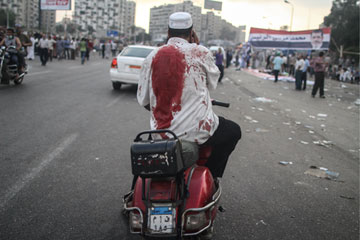
A man on a scooter pauses in Rabaa Square, Cairo, after police opened fire on Morsi supporters there on July 27, 2013.
History shows that in the aftermath of any revolution, some of its leaders will gradually sacrifice their high-minded principles for political convenience. But there is something particularly dispiriting about the way Egypt's so-called liberals, who played a key part in the thrilling 2011 uprising that overthrew President Hosni Mubarak, have so enthusiastically reneged on the fundamental tenets of political pluralism and democracy. There could scarcely be anything less democratic, after all, than backing a military takeover of a government that, while ineffective and unpopular, was nevertheless elected in a free and fair vote.
It's not easy being a liberal in the Arab world; you are doomed to face frustration at the ballot box. In a religiously conservative country like Egypt, it is difficult for liberal parties — which often lack deep local networks and grassroots support — to win in free elections. But even under the increasingly heavy-handed rule of President Mohamed Morsi and his Muslim Brotherhood allies, liberals had a chance to work within the system to counterbalance Morsi. Most liberals opted not to meet that challenge and supported the June 2012 dissolution of Egypt's democratically elected parliament. And when the military toppled Morsi on July 3, most backed that move too. "It was a painful decision," said Mohamed ElBaradei, Egypt's most prominent liberal politician, who has taken the position of acting Vice President in the new military-backed government. "It was outside the legal framework, but we had no other choice."
The liberal chorus that supported Morsi's ouster argues it is sometimes necessary to put democracy on pause in order to save it. That's an old story. In Algeria, liberals largely stood by — or actively cheered on — as the military aborted the country's 1992 elections when Islamists were poised to win, provoking a bloody civil war that would rage for years. Algerian democracy remains paused to this day. Yet, many liberals across the Arab world fear, even hate, Islamists more than they are willing to believe in democracy.
In the Egyptian context, the word liberal is often used as a catchall for people who don't like Islamists. It is unclear what liberalism really means in a country like Egypt, where many who would self-identify as liberal engage in army worship or believe Islamist parties should be banned from even contesting elections in the first place. On the other hand, Islamists have a distinctive worldview — and a project for transforming the individual and society in accordance with Islamic law. Liberals and Islamists have become ever more ideologically divided in the Arab Spring countries.
Take the situation in which Tunisia's Ennahda party finds itself, especially since the recent assassinations of two leftist politicans have threatened to derail the democratic transition. The Islamist party has avoided many of the mistakes of its Egyptian counterparts. It has governed in coalition with two secular parties, withdrawn references to Islamic law in the draft constitution, and has done very little that could be considered extremist. Yet Tunisia's liberals — animated by hard-line French-style secularism — routinely accuse Ennahda of being stealth radicals waiting for the right moment to implement an extremist agenda. They have also reflexively blamed Ennahda for the recent killings of opposition politicians. (The government named an Islamist extremist as the main suspect in two killings.) This liberal assumption of wrongdoing creates an impasse: liberals fear Islamists not only for what they have done, but also for what they might to do in the future.
Many Egyptian liberals have given way to these fears, leading them to embrace a military hungry for control. This is already backfiring. The new order has quickly proved more repressive than the Morsi government ever was during its one year in power. The Ministry of Interior has announced the reinstatement of Mubarak-era departments to monitor political and religious activism. And Egyptians have just seen what happens when protesters defy the military; security forces shot dead at least 140 Morsi supporters on July 8 and July 27.
Just after the coup, ElBaradei declared: "[The army] has no interest in taking a forward role in politics." Such talk now looks absurd. If liberals want the word liberal to have any meaning, they have no choice now but to speak out against the military. Even if that puts them next in the firing line.
Hamid is director of research at the Brookings Doha Center
